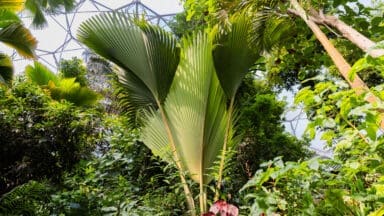
Commonly known as coco de mer or double coconut, Lodoicea maldivica is native to the islands of Praslin and Curieuse in the Seychelles and is famous for producing the world’s largest and heaviest seed.
These remarkable seeds, characterised by their somewhat suggestive shape and weighing up to an impressive 25 kilograms, while measuring up to half a metre in length, continue to captivate the attention of scientists, tourists, and poachers alike. Due to over harvesting, the wild mature Lodoicea palms population has dwindled to approximately 8,000 individuals, confined to the two islands of Praslin and Curieuse. The species is now listed as Endangered on the IUCN Red List of Threatened Species.
Gifted by the Ministry of Agriculture, Climate Change and Environment in the Seychelles, the precious seed was planted in the Eden Project’s Rainforest Biome in 2003.
On display, the mature leaf has taken around 10 years to develop to this stage and is approximately four metres in length, making it one of the largest leaves in the Biome. According to the Eden Project, it is believed to be the first to reach maturity in the United Kingdom. At full potential, the leaf is expected to reach 8-10 metres in size.
A coco de mer has a prolonged life cycle and can live for up to 800 years, reaching up to 25-34 metres tall. Leaf size is crucial for the survival of the species, acting as a funnel for water and nutrients to reach the soil. In turn, this assists germination and growth of potential seeds.
Peter Jones, the Eden Project’s Director of horticulture, said: “We are thrilled to provide an opportunity for our visitors to see an example of the coco de mer’s majestic leaves in maturity, and in doing so, help tell the story of this incredible plant and the importance of its survival. As an educational charity, we are proud to play our part in the conservation of this extraordinary species and look forward to seeing it thrive for many more years to come.”
Earlier this year, a baobab tree flowered in Biome, also believed to be another first in the UK.

